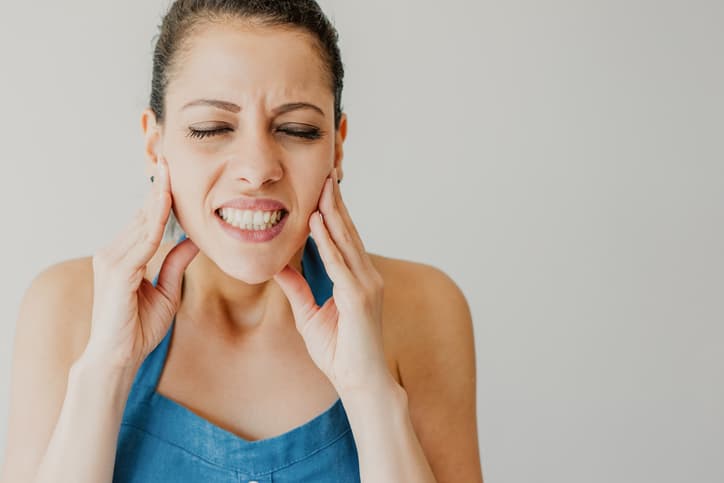Teeth grinding in sleep, also known as bruxism, is not uncommon. The effects might be painful or go completely unnoticed until you see your dentist. Read on to learn how to spot the signs of teeth grinding and how to manage the habit to get a better night’s rest.
in sleep, also known as bruxism, is not uncommon. The effects might be painful or go completely unnoticed until you see your dentist. Read on to learn how to spot the signs of teeth grinding and how to manage the habit to get a better night’s rest.
How to Tell If You’re Grinding Your Teeth At Night
Many people wake up in the morning and question if they’ve actually had a good night’s sleep. If you experience bruxism, you may be asking yourself this question because of a headache, neck pain or jaw joint pain and stiffness. These are the earliest signs of nighttime bruxism. If you wake up feeling discomfort or pain at your temples or in your jaw joint (also known as the temporomandibular joint or TMJ), it’s time to talk to your dentist.
A roommate or sleeping partner may be the first one to alert you to teeth grinding in sleep. While many people complain of snoring, a complaint about grinding could help safeguard your teeth! Ask your partner if they have heard you clenching or grinding your teeth at night.
Keep a Sleep Diary
Record how you generally feel in the morning. Do you notice your teeth hurting when you wake up? Have you experienced headaches radiating from the back of your neck, at your hairline or at your temples? Recording this information before going to the dentist will help you talk with them about the frequency and severity of grinding.
You can keep a sleep diary. Though it may sound silly, NBC reports that doctors who practise sleep medicine often instruct patients to keep a sleep log to better manage the daytime problems associated with poor sleep, such as fatigue, mental fog and irritability. A thorough sleep diary includes not only when you went to bed and when you woke up, but also any times you were up during the night and contributing factors like your caffeine and alcohol intake. Taking a minute in the evening and in the morning to jot down a note will you help to identify what may be contributing to your grinding.
How to Talk to Your Dentist About Teeth Grinding in Sleep
The next step in getting better sleep is seeing your dentist. Sharing your sleep diary and your log of symptoms will help your dentist identify whether bruxism is the cause of your pain and recommend a treatment. They may also ask you about stressful events in your life or your mental health history. According to the American Dental Association, people who experience anxiety or high levels of stress may be more susceptible to teeth grinding.
Many dentists will take an X-ray of the TMJ to look for wear on the joint, which can lead to problems, such as temporomandibular joint disorder. Your dental professional may also point out wear from grinding across the chewing surface of the teeth and recommend restorative treatment depending on the damage.
Nighttime Mouth Guards
To protect your teeth, your dentist may recommend a night guard, a custom-fitted plastic mouth guard that helps keep your teeth from damaging each other when you clench or grind. The mouth guard helps balance the biting pressure throughout the night, helping you stay in a more relaxed position while you sleep.
Resolving nighttime bruxism can help with physical comfort, alleviate dental problems and may help you sleep better at night. Talk your dentist about kicking your teeth grinding habit out of bed.
